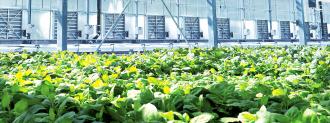A tobacco-based COVID-19 vaccine just secured FDA approval for human testing.
While the FDA has already authorized coronavirus vaccines developed by Pfizer and Moderna, the tobacco vaccine could be a better shot for people in many parts of the world — and together, they could all help end the pandemic.
Two Vaccines Are Not Enough
There are several types of coronavirus vaccines, and the ones Pfizer and Moderna developed are both mRNA-based.
This kind of vaccine is new — the FDA had never approved an mRNA vaccine before Pfizer’s — and they work by delivering a bit of genetic code that triggers an immune response.
The efficacy of the vaccines has been remarkable, but neither is going to be able to end the pandemic on its own.
For one, both vaccines must be stored and shipped at very cold temperatures — that requirement will put them out of reach in many parts of the world.
Additionally, while mRNA vaccines are easier to scale than some more common types, even Pfizer and Moderna combined can’t produce enough doses for everybody — at least not next year.
The tobacco-based COVID-19 vaccine under development by British American Tobacco (BAT) could be an ideal complement to the other vaccines.
BAT’s Tobacco-Based COVID-19 Vaccine
To create their tobacco-based COVID-19 vaccine, BAT researchers started by using a cloned bit of the coronavirus’s genetic code to produce an antigen — that’s the part of the virus that triggers an immune response.
They then insert just the antigen into tobacco plants, where it reproduces as the plant grows, making more antigens that can be harvested from the plants and used to make a vaccine.
The tobacco-based COVID-19 vaccine could be useful in places without a reliable cold chain.
If it works, the advantages are huge: it can be produced rapidly and cheaply, thanks to fast-growing tobacco plants.
The researchers say they can grow, harvest, and process enough of the coronavirus antigen for 3 million vaccine doses in about six weeks — it would take months to create that many using more conventional methods for antigen production, according to BAT.
The company also says its coronavirus vaccine has the potential to be stored at room temperature — that would make it a viable alternative to mRNA vaccines in places that lack a reliable cold chain.
Before any of that can happen, though, BAT needs to find out whether its vaccine is safe and effective in humans.
To that end, the company plans to begin enrolling 180 healthy adults in its phase 1 trial. That trial will test two dose sizes of the tobacco-based COVID-19 vaccine, and the researchers expect to have results from the study in mid-2021.
Even if the plant-based vaccine arrives later than others, if it works, the technology has the potential to revolutionize future vaccine production, just like the mRNA vaccines.
We’d love to hear from you! If you have a comment about this article or if you have a tip for a future Freethink story, please email us at tips@freethink.com.






